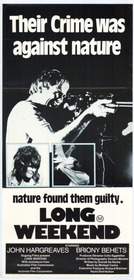Our editor-in-chief Nate Yapp is proud to have contributed to the new book Hidden Horror: A Celebration of 101 Underrated and Overlooked Fright Flicks, edited by Aaron Christensen. Another contributors include Anthony Timpone, B.J. Colangelo, Dave Alexander, Classic-Horror.com's own Robert C. Ring and John W. Bowen. Pick up a copy today from Amazon.com!
Long Weekend (1978)
Within the nature run amok sub-genre there is a specific type of film in which animals not only go on the rampage, they do so en masse. The Food of the Gods, Day of the Animals, and Frogs are all textbook examples of this variation in form. As with any category of films there are common plot elements which help define these features. In general these include a group of people who, for various reasons, leave their normal environment for a remote isolated location, and some kind of motivating factor that causes the animal's aggressions. These factors can include pollution, corporate greed, and even military testing. Although director Colin Eggleston's Long Weekend follows this basic structure the film differentiates itself by making minor adjustments to the formula, and displaying a higher than usual level of talent not only in front of the camera, but behind it as well.
On the surface, the plot is rather basic. A married couple, Peter (John Hargreaves) and Marcia (Briony Behets), head for a remote stretch of the Australian coastline in hopes of mending their fractured marriage. Along the way we come to realize that the couple's marital issues are not going to be resolved by taking a simple vacation in the wilderness. Amidst their constant bickering the couple are also shown to have a complete disregard for their natural surroundings. Following a series of careless incidents involving the local wildlife, and the environment, the couple arrive at their destination only to find themselves in a struggle for survival against every living thing around them.
The screenplay by legendary Ozploitation screenwriter Everett De Roche is much deeper than a simple plot synopsis might suggest. There's a strong psychological angle here that's atypical of a "animal attacks" feature. Peter and Marcia are mentally assaulted by not only the animals that they are forced to contend with, but each other as well. Both have had affairs, and Marcia has recently gone through an abortion. As a natural side effect of these events the couple have grown resentful of one another, which only worsens as their situation deteriorates.
As the title suggests, the film takes place over the course of a holiday weekend which allows De Roche the ability to set a torrid pace. The couples aforementioned marital problems are revealed amidst a ever increasing series of animal attacks which enables the film to have a continual flow of action. The film never loses grasp of this, and only intensifies in the second half as the viewer is hit with a rapid succession of reveals which give the film an almost supernatural slant.
As with the screenplay, the acting is quite a surprise. In general this type of film would have a whole slew of stock characters lined up as victims for whatever animal that happens to be on the rampage. Since the characters are almost always secondary to the attacks, the acting tends to be suspect at best. Long Weekend alters all of this by having a cast that for all intents and purposes, only features two people. Hargreaves and Behets act their way through a variety of emotional states, and come across as quite believable. The couple go from showing signs of loving each other, to absolute hatred during the course of the film, and it's fascinating to watch. You can feel tension, and fear in all the right places as they spiral out of control towards a shocking conclusion.
The animal attacks featured in Long Weekend are portrayed in an honest fashion which adds a touch of realism that's often lacking in a film in this subgenre. For instance, after Marcia returns to camp with an eagle's egg, Peter is attacked by the bird's mother. Although he is pecked and clawed by the bird, the damage done is more mental than physical. The experience puts the couple's nerves on edge, but aside from that Peter's wounds are merely superficial. By using this naturalistic approach, Eggleston creates an air of believability which rings true for the viewer.
Noticeable within the subtle shifts in form is the talent of cinematographer Vincent Monton. By taking advantage of a perfect filming location he creates a backdrop that is both beautiful, as well as frightening. The film veers from stunning wide shots of the coastline, to tight claustrophobic shots of the wilderness, providing a menacing sense of place. His use of subjective camera angles, which give one the feeling that the couple are being watched, as well as his close-ups of the wildlife create an atmosphere of dread that comes across as palpable. Shot in true anamorphic wide screen, this has the polish of a far more expensive feature,which is a direct credit to Monton's work.
Long Weekendhas achieved cult status over the years due to the fact that it's a different take on a style of film which had grown repetitive over the years. By twisting common themes found within the sub-genre, Colin Eggleston has created a film that is still relevant, and still frightful in its implications.The film stands today as a highpoint of Australian genre film making, and is the true definition of a "hidden gem".









Great review, Bruce. I'm
Great review, Bruce. I'm definitely going to seek this one out now. Welcome aboard!
"He went for a little walk! You should have seen his face!"
Thanks Nate! You should give
Thanks Nate! You should give this one a look, I think you'll enjoy it.
As Nate said, very
As Nate said, very well-written review. You have a very economic and precise use of language, which is especially refreshing after I read some of my own drawn-out pieces! This film does seem interesting, particularly how you mentioned how it's more focused on the tension and drama between the couple and their predicament as opposed to being a schlocky animal-amuck-fest. Great work, sir! Look forward to seeing more from you.
I remember this one from
I remember this one from years ago I think. Lasting memory is of a Dead sea creature whose body keeps shifting location. That's this one, right?
Yes, you are right. That's
Yes, you are right. That's one of the ways the film takes on an almost supernatural slant.
For the last few years, when